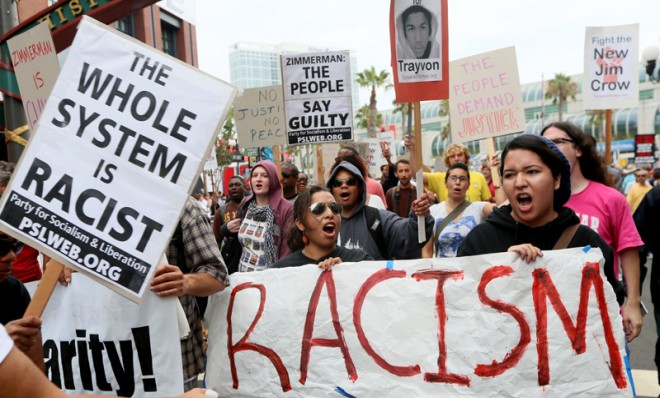How the Zimmerman ruling worsened America's racial divide
Things haven't been this bad since O.J.


Americans' views of race relations have soured since the verdict in the George Zimmerman trial, according to an NBC News/Wall Street Journal poll released Wednesday.
In the survey, just 52 percent of Americans said they believed race relations in the U.S. were "very" or "fairly" good, the lowest mark in almost two decades. Back in October 1995 — the month O.J. Simpson was found not guilty of murder and President Bill Clinton delivered a big speech on race — 34 percent of Americans had positive feelings about race relations in the nation.
The 52 percent finding is a sharp drop from as recently as two years ago, when NBC found that seven in 10 Americans thought race relations were very or fairly good.
The Week
Escape your echo chamber. Get the facts behind the news, plus analysis from multiple perspectives.

Sign up for The Week's Free Newsletters
From our morning news briefing to a weekly Good News Newsletter, get the best of The Week delivered directly to your inbox.
From our morning news briefing to a weekly Good News Newsletter, get the best of The Week delivered directly to your inbox.
Zimmerman was found not guilty earlier this month of murdering Trayvon Martin, the unarmed black teen whom he fatally shot in a Florida suburb. Zimmerman claimed he fired in self-defense.
The poll also showed a massive divide on the issue along racial lines. While 52 percent of whites and 60 percent of Hispanics said race relations in America were good, 58 percent of African-Americans said they were bad, including 33 percent who said they were "very bad."
A second question asking whether respondents felt that "America is a nation where people are not judged by the color of their skin but by the content of their character" — a reference to the famous Martin Luther King Jr. quote — elicited an even starker split.
Fifty-nine percent of whites and 54 percent of Hispanics agreed with that statement, but only 19 percent of African-Americans said the same. On the flip side, nearly eight in 10 African-Americans said they disagreed with that statement — including a 54 percent majority who "strongly disagreed" with it.
A free daily email with the biggest news stories of the day – and the best features from TheWeek.com
"This is about as polarizing as it gets," Jay Campbell, one of the pollsters who conducted the survey, told NBC.
Other recent surveys have found similar effects from the Zimmerman trial. A Washington Post/ABC poll this week found that 87 percent of African-Americans thought Zimmerman was unjustified in shooting Martin, while only 33 percent of whites said the same. And a Pew survey found that 86 percent of African-Americans were dissatisfied with the not guilty verdict, versus 42 percent for adults overall.
Those findings echoed President Obama's remarks last Friday in which he said black men often feel they are treated unfairly because of their skin color. "Those sets of experiences inform how the African-American community interprets what happened one night in Florida," he said.
"There are very few African-American men in this country who haven't had the experience of being followed when they were shopping in a department store," he said. "That includes me."
Jon Terbush is an associate editor at TheWeek.com covering politics, sports, and other things he finds interesting. He has previously written for Talking Points Memo, Raw Story, and Business Insider.


